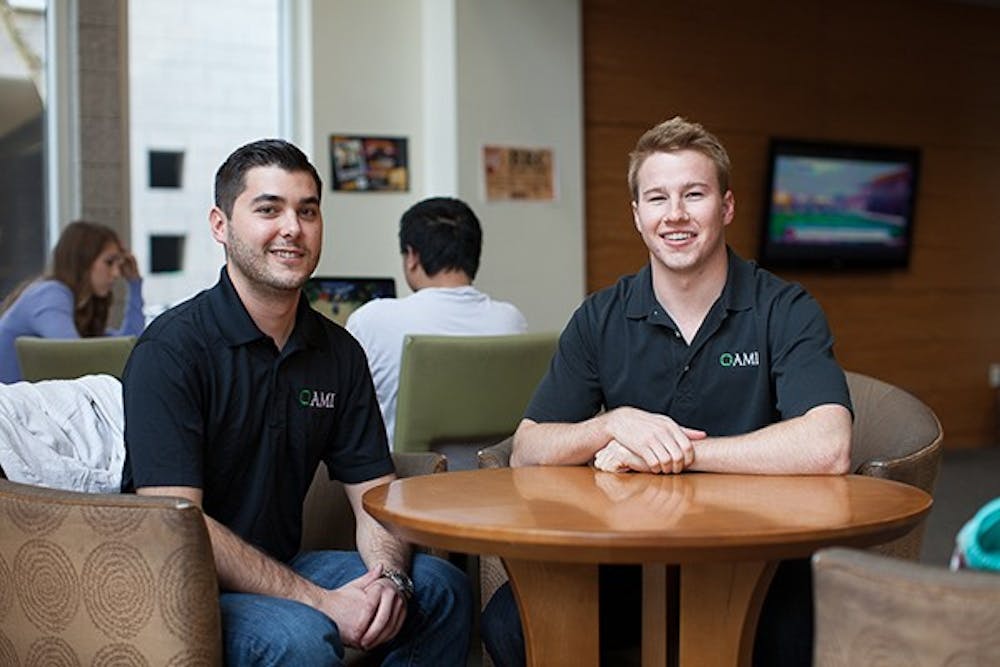 Executive director, Christopher Mendezona (left) and co-founder, Jeff Wells (right) of Arizona Microcredit Initiative (AMI) tells us how they are seeing huge successes with supporting local businesses. AMI was founded by a small group of honors students to help small businesses with their start-ups. (Photo by Ryan Liu)
Executive director, Christopher Mendezona (left) and co-founder, Jeff Wells (right) of Arizona Microcredit Initiative (AMI) tells us how they are seeing huge successes with supporting local businesses. AMI was founded by a small group of honors students to help small businesses with their start-ups. (Photo by Ryan Liu)
Looking to spur growth for local businesses, students from Barrett, the Honors College offer entrepreneurs financial loans and professional classes to drive development and get their startups off the ground.
Arizona Microcredit Initiative is a nonprofit program created by students in 2011 that makes microloans ranging from $1,000 to $5,000 to small businesses that would otherwise not qualify for conventional bank loans. In the past few months, AMI has grown in both number of clients they work with and employees at the organization.
Chris Mendezona, executive director of AMI and marketing junior, said this business model assists individuals who would not be able to receive assistance through banks because of their business’ size or sales revenue.
“Banks aren’t looking to bother with small loans like that,” he said. “Our clients are under-resourced entrepreneurs. We don’t want to get them under a mountain of debt.”
AMI offers half-year or one-year loans with payments that have an interest rate of 10 percent, an amount much lower than what banks generally charge. Mendezona said the goal of these loans is not to grow personal wealth for AMI employees, but rather to give clients a chance at finding financial success.
“Since we’re not growing revenue for ourselves, the money goes to small operations and future loans,” he said. “It works out great. We’re taking money and putting it back out.”
Payments are often on a flexible schedule. Mendezona said he had a client whose furnace broke the week a payment was due, so AMI restructured his loan to ensure he would have enough resources to fix the appliance as soon as possible.
In addition to microloans, AMI offers classes and individual face-to-face meetings with entrepreneurs to create business strategies and future plans. Additionally, clients must also schedule monthly meetings with an AMI member to address any business concerns they have.
“There’s a social interest,” Mendezona said. “We get involved in their company so that customers pay us back. We have 100 percent payments made.”
Mendezona said there were some challenges for AMI to gain credibility as a viable resource for business owners. However, he said clients quickly overcame the peculiarity of working with college students.
“When you’re a 20-year-old walking to go meet with a middle-aged businessperson, it can be hard to get that respect,” he said. “After building a relationship, they see we provide benefits to them.”
Because business owners often are unfamiliar with modern technologies and strategies, they rely on the contemporary knowledge and business training these students offer.
Jeff Wells, one of the founders of AMI and a senior majoring in computer science, said the classes AMI hosts are a combination of strengths that both students and their clients benefit from when collaborating together.
“They have the drive, but not the business theory behind it,” he said. ”It’s a really good mix of their experience on their side and the academic theory on our side.”
In classes and personal meetings, students from AMI use the tools they learned through ASU business programs to help their clients make the best decisions for their startups.
“We’re always changing something, innovating to keep relevancy,” Wells said. “We have a model to determine if it’s going to be successful based on their sales numbers, because we don’t want to put them in debt.”
Since AMI was founded three years ago, it has grown in both number of employees and clients. Although Wells is graduating in May, he expects this trend to continue.
“We have a solid foundation and we are ready to explode,” he said. “From here, moving on is going to be straight growth.”
Carla Keaton is one of three business owners who makes monthly payments on a loan with AMI. She owns a business named Un Petit Merlot that offers in-house wine and painting parties.
She said she believes the frequent meetings with students have allowed her to reach financial success.
“I did get a loan, but I think more (important) was the marketing help from them,” she said. “They actually meet with me, and that’s what is really nice.”
For example, Keaton said she did not know how to create a website for her business. However, one web design student from AMI helped her build a greater presence on the web. She said it’s these kinds of resources that separate AMI from traditional bank loans.
“There’s somebody there that can help you with any aspect of what you need,” Keaton said. “They see new, sometimes non-traditional ways of approaching things. They actually really want to help you succeed.”
Reach the reporter at shari.rose@asu.edu or follow her on Twitter @sharir55




